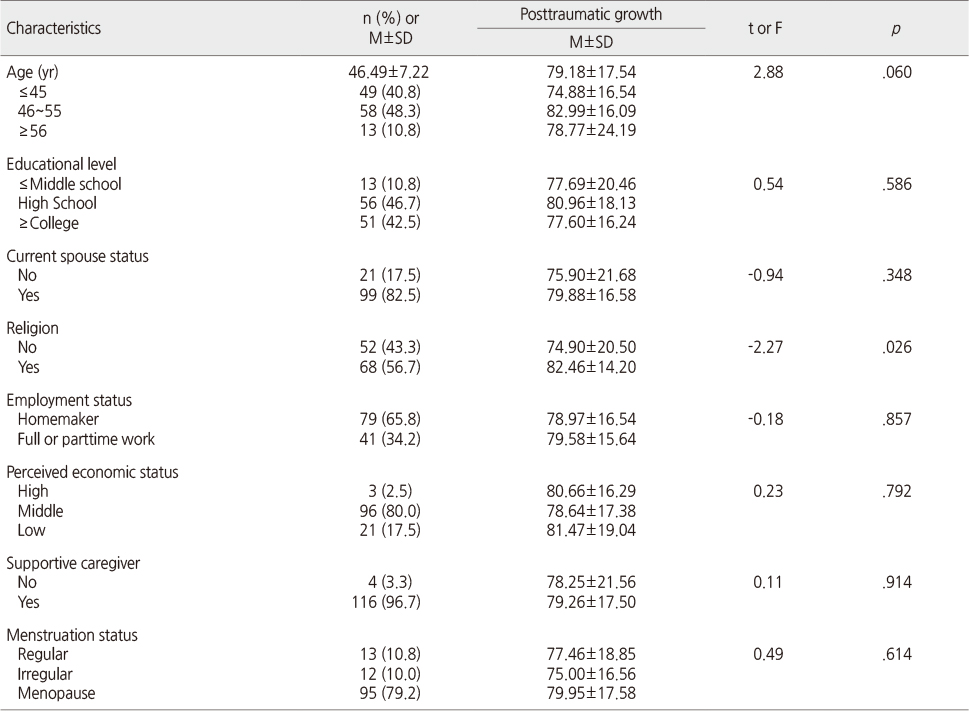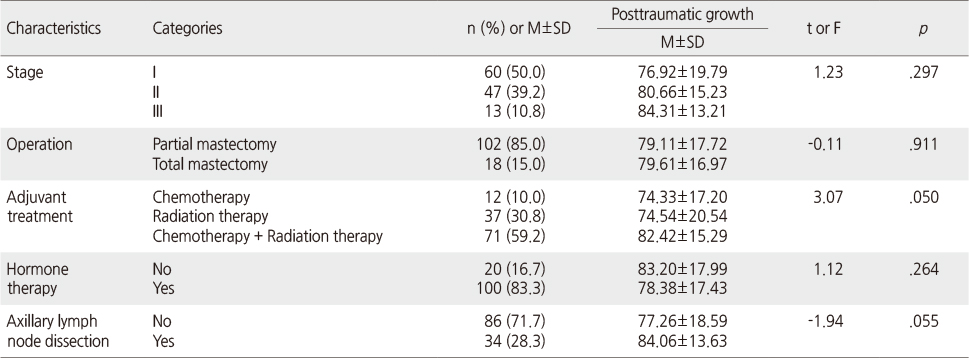Articles
- Page Path
- HOME > J Korean Acad Nurs > Volume 46(3); 2016 > Article
-
Original Article
- Factors Influencing Posttraumatic Growth in Survivors of Breast Cancer
- Jin-Hee Park, Yong-Sik Jung, Youngmi Jung
-
Journal of Korean Academy of Nursing 2016;46(3):454-462.
DOI: https://doi.org/10.4040/jkan.2016.46.3.454
Published online: June 30, 2016
1College of Nursing · The Institute of Nursing Science, Ajou University, Suwon, Korea.
2Department of Surgery, School of Medicine, Ajou University, Suwon, Korea.
3College of Nursing, Ajou University, Suwon, Korea.
- Address reprint requests to: Jung, Youngmi. College of Nursing, Ajou University, 206 World cup-ro, Yeongtong-gu, Suwon 16499, Korea. Tel: +82-31-219-7019 Fax: +82-31-219-7020, j-dudal@hanmail.net
© 2016 Korean Society of Nursing Science
This is an Open Access article distributed under the terms of the Creative Commons Attribution NoDerivs License. (http://creativecommons.org/licenses/by-nd/4.0/) If the original work is properly cited and retained without any modification or reproduction, it can be used and re-distributed in any format and medium.
Abstract
-
Purpose
- Posttraumatic growth (PTG) is defined as 'positive psychological change experienced as a result of a struggle with highly challenging life circumstances'. The purpose of this study was to identify the level of PTG and its correlates in Korean patients with breast cancer.
-
Methods
- A sample of 120 participants was recruited from outpatients, who had successfully completed primary treatment of breast cancer at a university hospital., Data were collected from June to December, 2014 using Posttraumatic Growth Inventory, lllness Intrusiveness Rating Scale, Cancer Coping Questionnaire, Revised Life Orientation Test and The Multidimensional Scale of Perceived Social Support.
-
Results
- Total score for the PTG was 79.18±17.54 in patients surviving breast cancer. Bivariate analyses indicated that PTG was positively associated with having a religion, perceived social support, greater optimism, cancer coping, and illness intrusiveness. Results of the regression analysis showed that cancer coping (β=.29, p=.001), optimism (β=0.28, p=.001) and illness intrusiveness (β=0.17, p=.037) were statistically significant in patients' PTG.
-
Conclusion
- The research findings show that the variables of cancer coping, optimism and illness intrusiveness significantly explain PTG and these psychological variables can be used to provide improvement in PTG for patients with breast cancer
This work was funded by the Department of Nursing, Graduate School, Ajou University in Korea.
The authors declared no conflict of interest.
- 1. Korean Breast Cancer Society. Breast cancer facts & figures 2014. Seoul: Author; 2014.
- 2. Liu JE, Wang HY, Wang ML, Su YL, Wang PL. Posttraumatic growth and psychological distress in Chinese early-stage breast cancer survivors: A longitudinal study. Psychooncology. 2014;23(4):437–443. ArticlePubMed
- 3. Tedeschi RG, Calhoun LG. The posttraumatic growth inventory: Measuring the positive legacy of trauma. J Trauma Stress. 1996;9(3):455–471. ArticlePubMed
- 4. Yun M, Song M. A qualitative study on breast cancer survivors' experiences. Perspect Nurs Sci. 2013;10(1):41–51.
- 5. Tedeschi RG, Calhoun LG. Posttraumatic growth: Conceptual foundations and empirical evidence. Psychological Inquiry. 2004;15(1):1–18. Article
- 6. Danhauer SC, Case LD, Tedeschi R, Russell G, Vishnevsky T, Triplett K, et al. Predictors of posttraumatic growth in women with breast cancer. Psychooncology. 2013;22(12):2676–2683. ArticlePubMedPDF
- 7. Silva SM, Crespo C, Canavarro MC. Pathways for psychological adjustment in breast cancer: A longitudinal study on coping strategies and posttraumatic growth. Psychol Health. 2012;27(11):1323–1341. ArticlePubMed
- 8. Bellizzi KM, Blank TO. Predicting posttraumatic growth in breast cancer survivors. Health Psychol. 2006;25(1):47–56. ArticlePubMed
- 9. Wang ML, Liu JE, Wang HY, Chen J, Li YY. Posttraumatic growth and associated socio-demographic and clinical factors in Chinese breast cancer survivors. Eur J Oncol Nurs. 2014;18(5):478–483. ArticlePubMed
- 10. Thornton AA, Perez MA. Posttraumatic growth in prostate cancer survivors and their partners. Psychooncology. 2006;15(4):285–296. ArticlePubMed
- 11. Bozo O, Gündogdu E, Büyükasik-Colak C. The moderating role of different sources of perceived social support on the dispositional optimism-posttraumatic growth relationship in postoperative breast cancer patients. J Health Psychol. 2009;14(7):1009–1020. ArticlePubMedPDF
- 12. Scheier MF, Carver CS, Bridges MW. Distinguishing optimism from neuroticism (and trait anxiety, self-mastery, and self-esteem): A reevaluation of the life orientation test. J Pers Soc Psychol. 1994;67(6):1063–1078. ArticlePubMed
- 13. Büyükaşk-Colak C, Gündoğu-Aktürk E, Bozo O. Mediating role of coping in the dispositional optimism-posttraumatic growth relation in breast cancer patients. J Psychol. 2012;146(5):471–483. ArticlePubMed
- 14. Buxton A. Posttraumatic growth in survivors of breast cancer: The role of dispositional optimism, coping strategies, and psychosocial interventions [dissertation]. Toronto, CA, University of Toronto. 2011;1–137.
- 15. Sears SR, Stanton AL, Danoff-Burg S. The yellow brick road and the emerald city: Benefit finding, positive reappraisal coping and posttraumatic growth in women with early-stage breast cancer. Health Psychol. 2003;22(5):487–497. ArticlePubMed
- 16. Cordova MJ, Giese-Davis J, Golant M, Kronenwetter C, Vickie C, Spiegel D. Breast cancer as trauma: Posttraumatic stress and posttraumatic growth. J Clin Psychol Med Settings. 2007;14(4):308–319. ArticlePDF
- 17. Yang AJ. Mindfulness, positive cancer coping styles, and posttraumatic growth in breast cancer survivor: The mediating effect of positive coping styles [master's thesis]. Seoul, Ewha Womans University. 2009;1–81.
- 18. Lee S, Kim YJ. Posttraumatic growth of patients with breast cancer. J Korean Acad Nurs. 2012;42(6):907–915. ArticlePubMed
- 19. Kim HJ, Kwon JH, Kim JN, Lee R, Lee KS. Posttraumatic growth and related factors in breast cancer survivors. Korean J Health Psychol. 2008;13(3):781–799.Article
- 20. Song SH, Kim KH, Hong SL, Park JH. Validity and reliability of the Korean version of the posttraumatic growth inventory. Korean J Health Psychol. 2009;14(1):193–214. Article
- 21. Moorey S, Frampton M, Greer S. The Cancer coping questionnaire: A self-rating scale for measuring the impact of adjuvant psychological therapy on coping behaviour. Psychooncology. 2003;12(4):331–344. ArticlePubMed
- 22. Kim JN, Kwon JH, Kim SY, Yu BH, Hur JW, Kim BS, et al. Validation of Korean-cancer coping questionnaire (K-CCQ). Korean J Health Psychol. 2009;9(2):395–414.
- 23. Zimet GD, Dahlem NW, Zimet SG, Farley GK. The multidimensional scale of perceived social support. J Pers Assess. 1988;52(1):30–41. Article
- 24. Shin JS, Lee YB. The effects of social supports on psychosocial well-being of the unemployed. Korean J Soc Welf. 1999;37:241–269.
- 25. Yom YM. The effect of learned optimism program for college students [master's thesis]. Daegu, Keimyung University. 1999;1–97.
- 26. Devins GM, Binik YM, Hutchinson TA, Hollomby DJ, Barre PE, Guttmann RD. The emotional impact of end-stage renal disease: Importance of patients' perception of intrusiveness and control. Int J Psychiatry Med. 1983;13(4):327–343. ArticlePubMedPDF
- 27. Suh M, Noh S, Devins GM, Kim K, Kim K, Song J, et al. Readjustment and social support of the post hospitalized stroke patients. J Korean Acad Nurs. 1999;29(3):639–655.ArticlePDF
- 28. Seligman MEP. Woo MS Choi HY . Learned optimism: How to change your mind and your life. Anyang: Mulpure; 2012. p. 359–423.
- 29. Schroevers MJ, Helgeson VS, Sanderman R, Ranchor AV. Type of social support matters for prediction of posttraumatic growth among cancer survivors. Psychooncology. 2010;19(1):46–53. ArticlePubMed
- 30. McDonough MH, Sabiston CM, Wrosch C. Predicting changes in posttraumatic growth and subjective well-being among breast cancer survivors: The role of social support and stress. Psychooncology. 2014;23(1):114–120. ArticlePubMed
REFERENCES
Figure & Data
REFERENCES
Citations

- The influence of locus of control, coping strategies and time perspective on post-traumatic growth in survivors with primary breast cancer
Alexandra-Cristina Paunescu, Marina Kvaskoff, Cyrille Delpierre, Lidia Delrieu, Guillemette Jacob, Myriam Pannard, Marie Préau
BMC Psychology.2025;[Epub] CrossRef - Do caregivers of traumatic brain injury survivors experience post-traumatic growth? A mixed-methods study exploring the positive experiences of informal caregivers
Molly Hillyard, Ryan Westley, Jade Kettlewell, Melissa Brunner
Brain Impairment.2025;[Epub] CrossRef - Post-traumatic growth and its influencing factors in first-episode stroke patients: a cross-sectional study
Minli Hu, Yue Ban, Zhihui Li, Yu He, Liping Deng, Xiaohua Xie
BMC Psychology.2025;[Epub] CrossRef - Factors Influencing Resilience in Patients with Multiple Myeloma: A Cross-Sectional Study
Hae-Lyeon Jeon, Hye-Ah Yeom
Korean Journal of Adult Nursing.2024; 36(1): 41. CrossRef - Post-traumatic Growth Experiences of Breast Cancer Survivors: A Grounded Theory Approach
Seung-Kyoung Yang, Young-Suk Park, Eun-Joo Lee
Journal of Korean Association for Qualitative Research.2024; 9(2): 79. CrossRef - Social Reintegration Experiences of Young Adult Cancer Survivors
Ji Seong Yi, Song Yi Lee
Behavioral Sciences.2024; 14(11): 1101. CrossRef - A Structural Equation Model for Posttraumatic Growth among Cured Patients with COVID-19
Soo Young An, Heejung Choi
Journal of Korean Academy of Nursing.2023; 53(3): 309. CrossRef - Effects of Post Traumatic Growth on Successful Aging in Breast Cancer Survivors in South Korea: The Mediating Effect of Resilience and Intolerance of Uncertainty
Su Jeong Yi, Ku Sang Kim, Seunghee Lee, Hyunjung Lee
Healthcare.2023; 11(21): 2843. CrossRef - Pathways to post-traumatic growth in Korean female cancer patients: the mediation effects of coping strategies and resilience
Sumi Choi, Dongil Kim, Ahyoung Cho, Sohyun An, Changhyun Kim, Inhwa Yoo
European Journal of Psychotraumatology.2023;[Epub] CrossRef - Structural Equation Model for Psychosocial Adjustment of Breast Cancer Survivors Based on Family Resilience Model
Jiyoung Seo, Myungsun Yi
Korean Journal of Adult Nursing.2022; 34(2): 178. CrossRef - Cancer coping, healthcare professionals’ support and posttraumatic growth in brain-tumor patients
Jiyoung Kim, Nayeon Shin
Psychology, Health & Medicine.2022; 27(4): 780. CrossRef - Factors Associated with Post-Traumatic Growth in Patients with Breast Cancer Based on a Model of Post-Traumatic Growth
Hee Yeon Park, Ja Yun Choi
Asian Oncology Nursing.2022; 22(2): 65. CrossRef - Factors influencing posttraumatic growth in ovarian cancer survivors
Jeong Min Oh, Yoonjung Kim, Yeunhee Kwak
Supportive Care in Cancer.2021; 29(4): 2037. CrossRef - Factors Influencing Supportive Care Needs of Colorectal Cancer Survivors
Hyekyung Kim, Yang-Sook Yoo
Asian Nursing Research.2021; 15(1): 60. CrossRef - Factors associated with post-traumatic growth in male patients with rectal cancer: A cross-sectional study
Yuri Kim, Yoonjung Kim, Yeunhee Kwak
European Journal of Oncology Nursing.2021; 54: 102028. CrossRef - A Structural Model on the Post-Traumatic Growth of Police Officers
Seung Woo Han, Eun Suk Choi
Journal of Korean Academy of Community Health Nursing.2020; 31(3): 348. CrossRef - Stacking Ensemble Technique for Classifying Breast Cancer
Hyunjin Kwon, Jinhyeok Park, Youngho Lee
Healthcare Informatics Research.2019; 25(4): 283. CrossRef - Factors Influencing Posttraumatic Growth in Cancer Survivors
Jeong-Sook Park, You-Jeong Kim, Young-Seun Ryu, Mi-Hyang Park
Asian Oncology Nursing.2018; 18(1): 30. CrossRef - The relationship between cancer‐related worry and posttraumatic growth in adolescent and young adult cancer survivors
Glynnis A. McDonnell, Alice W. Pope, Tammy A. Schuler, Jennifer S. Ford
Psycho-Oncology.2018; 27(9): 2155. CrossRef - The Influence of Spiritual Well-Being, Self-Esteem, and Perceived Social Support on Post-Traumatic Growth among Breast Cancer Survivors
Eun Young Seo, Suhye Kwon
Asian Oncology Nursing.2018; 18(4): 232. CrossRef
The Difference of Posttraumatic Growth by Sociodemographic Characteristics (N=120)
Differences in Posttraumatic Growth by Clinical Characteristics (N=120)
Descriptive Statistics for Major Study Variables (N=120)
Intercorrelation among Major Study Variables (N=120)
Factors Influencing Posttraumatic Growth (N=120)
 KSNS
KSNS
 E-SUBMISSION
E-SUBMISSION





 Cite
Cite

